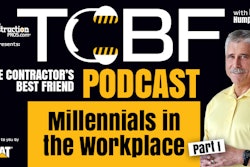Many of those in management positions today are befuddled and at times even frustrated by the latest crop of employees entering the workforce. Referred to as Generation Y — or the Millennials — this group is made up of individuals born between 1977 and 2000 and they number around 70 million.
If you are one of the befuddled and frustrated, brace yourself: these "children of the Baby Boomers," or "Echo Boom," will comprise 41 percent of the U.S. population by 2010 and almost 50 percent of the full-time labor force by that year, according to Russ Eckel and Andrew Herman, management consultants with the Nommos Group. In other words, Generation Y has the clout to reshape the workplace according to its priorities, and those priorities are proving to be quite different from those of the generations that went before it.
Despite these differences, however, there's room for everyone in today's workplace, provided all parties keep an open mind to compromise.
A historical perspective
With Ronald Reagan as its first authority figure, Generation Y grew up free from the terror of nuclear war, yet many witnessed the attacks of September 11 at an impressionable age. This generation could be defined by the "War on Terror" much as the Baby Boomers were defined by the Vietnam War and GenXers were affected by the Cold War. Whereas Boomers and Xers can remember a time when the "Iron Curtain" divided much of Europe and the U.S. space program was infallible, Generation Y‘s world view was shaped by the fall of the Berlin Wall and the Challenger explosion was etched in their minds as proof that the government couldn't protect seven astronauts from disaster, let alone the entire nation.
Economically, Generation Y has grown up in a time of unprecedented prosperity. Whereas Generation X came of age during an era of soaring national debt and a bleak job market in the recession of the early 90s, the Millennials can only remember a rosy economic picture.
While GenXers were raised by parents in the thick of the consciousness revolution of the 1970s — a time when Americans were distrustful of institutions and children often took a backseat to parental self-fulfillment, members of Generation Y are products of the "Baby on Board" era, raised by Baby Boomer parents obsessed with childrearing. These kids were shuttled between soccer practices and piano lessons, tutored in french and enlisted in community service projects, all to beef up college applications and resumes before they even reached high school. They have been pampered, nurtured and programmed with a slew of activities since they could walk.
Growing up with an unprecedented amount of technology at their fingertips, Millennials are a generation of multi-taskers. They can process information at warp speed, juggling email on their BlackBerries while talking on cell phones and trolling online.
Taking the good with the bad
Because they've been raised during a time of relative peace and prosperity by childcentric parents who, to some degree, view their children's accomplishments as extensions of themselves, the Millennials tend to be high performance and high maintenance.
According to Bruce Tulgan, a management consultant and founder of New Haven, CT-based RainMaker Thinking, which studies the lives of young people, members of Generation Y have a robust self-esteem, which is a positive as it translates into an abundance of confidence and an enthusiastic can-do attitude. The drawback to this, however, is that there's a general sense of entitlement in this age group that expects the world at 22. In other words, they want plum assignments and hefty paychecks but they're not as excited about paying their dues.
Because they have grown up with the idea that it's okay, even encouraged, to question authority, Tulgan says, Generation Y is much less likely to respond to the traditional style of management with its command and control methods. Millennials value their own opinions and are not timid about making them known. They prefer to take immediate ownership of tasks and duties. They also enjoy frequent feedback on their performance.
According to Eckel and Herman, as a whole, the "Ritalin Generation" has attention deficit; they get bored quickly and need constant change to stay stimulated.
The future workplace
Herman and Eckel claim the workplace of the future will feature several characteristics: variety, flexibility, feedback, in-house education and training, outside educational benefits, clear expectations, autonomy, diversity, communication, teamwork, openness to ideas and respect.
As a supervisor managing Generation Y, Eckel and Herman note that the traditional "Just do it" attitude won't work anymore. The Millennials crave a more collaborative style of management and appreciate an environment where creativity and independent thinking are encouraged.
Tulgan recommends using a coaching style of management, taking care to be rigorous with feedback. When possible, break projects down into smaller tasks and set several short deadlines.
Members of Generation Y often act as if they expect to be running the company weeks after getting hired in an entry level position. While this boundless optimism can translate into positive energy and innovative ideas, it can also accompany a general impatience that, if left unchecked, can result in high turnover.
One area that causes some members of older generations to bristle is the issue of how to dress in the workplace. The Millennnials are used to casual clothes such as flip flops and jeans and are not shy about showing off their tattoos and body piercings. Despite the fact that how one appears has little to do with job performance, it can create a significant generation gap that threatens morale and at its worst, can even alienate customers in more conservative industries. For the most part, experts say Generation Y will have to "get with the program" and adhere to established dress codes, but they add that employers could do their part and try to be reasonably flexible, realizing that formal business attire is going by the wayside in most organizations.
Equally hard for some traditionalists to take is the concept of flex-time. Eckel and Herman note that like GenXers before them, cohorts of Generation Y believe in a balance between work and their personal lives. Unlike career-oriented Baby Boomers who attach much of their self-worth to job performance, the Millennials do not "live to work." As such, they fully expect to be able to make their own hours and receive time off for family obligations and other personal commitments.
Work itself is not an end unto itself for Generation Y, according to Eckel and Herman. Instead, it is a vehicle for self-expression and personal creativity. Young people don't want the work because of the money; they want what the money can buy, so they work as much or as hard as they feel they have to in order to accomplish their often short-term objectives.
Making it work
Understanding the perspective and unique motivations of the newest generation in the workplace is helpful, but it means very little if your efforts don't create productive team members. So how can you effectively manage these rookies?
Eckel and Herman emphasize that the "new American worker" is ultimately a "knowledge worker." Millennials possess copious amounts of energy, creativity and understanding. They require expanded education and training systems which recognize that technical skills are necessary but not enough; mentoring and coaching are important but not sufficient.
More than anything, members of Generation Y are described as wanting to be fully engaged in the "big picture" of an organization; they want their job to have meaning.
What does this mean at your place of business? According to experts, you can be successful working with Generation Y if you:
Try to be flexible. The new American worker appreciates a less rigid schedule than previous generations. Experiment with ways to accommodate employees or, if that's not possible, use concrete incentives to encourage punctuality and adherance to your company's schedule.
Provide regular feedback. Today's workers need to know how they're doing — often. From the time they're hired, have a set timeframe for reviews. In between such meetings, be sure to let younger employees know — on the spot — if they've done something well or, likewise, if something was done incorrectly.
Offer training and educational opportunities. Cohorts of Generation Y enjoy learning and quickly grow bored. To keep employees fresh, periodically switch them to new departments and/or duties. Encourage employees to attend training programs, such as those conducted by manufacturers.
Ask their opinion. In traditional workplaces, the lowest man on the totem pole was told what to do, no questions asked. Today's workers want to understand the meaning of their duties and see how their efforts fit into the context of the big picture. In short, they want their input to be valued. Consider holding regular staff meetings with an open forum for employees to comment on work practices, etc. Be sure to stress the importance of constructive criticism and don't allow the meetings to devolve into bitch sessions.
Lighten up. As previously mentioned, employees entering the workforce today don't look like they did 20 years ago. Your youngest employee might sport a nose ring and have tattoos covering his forearms and/or unique facial hair. Keep in mind that these styles are just that: superficial expressions of one's taste in fashion. They don't have much to do with an employee's abilities or attitude. As long as an employee's appearance meets general standards of decency and is not overtly offensive to customers, consider being somewhat flexible. That being said, don't be afraid to assert yourself about the practical aspects of your company's dress code (such as wearing safe footwear and uniform, etc.).
Show respect. Everyone wants to be treated with respect, but today's newcomers to the workplace are different in that they were raised in an era that stressed positive reinforcement over discipline for negative behavior. Young people today don't take well to being scolded, but instead expect criticism to come with a smile and constructive comment.
Cultivating productive employees from the youngest members of the workforce will come with challenges for the older set, but if you make an effort to understand where Generation Y is coming from and what motivates its cohorts, the result can be a positive breath of fresh air for your business.




















